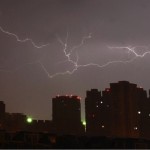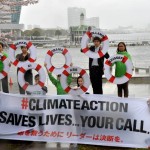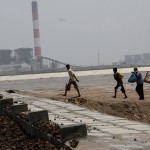- DETERRENCE: The Fifth Element: Enhancing Conventional Deterrence in East Asia
- DPRK: Illicit: North Korea’s Evolving Operations to Earn Hard Currency
- GOVERNANCE AND CIVIL SOCIETY: Confucian Guilt Spreads in Korea
- CLIMATE CHANGE ADAPTATION: Location Security and Environmental-Induced Displacement: A Case Study of the Riverine Islands in Bangladesh
- ENERGY SECURITY: Behind a Real-Estate Empire, Ties to India’s Gandhi Dynasty
 DETERRENCE: The Fifth Element: Enhancing Conventional Deterrence in East Asia, Robert Rubel, US Center for Naval War Studies, Information Dissemination, January 26, 2014
DETERRENCE: The Fifth Element: Enhancing Conventional Deterrence in East Asia, Robert Rubel, US Center for Naval War Studies, Information Dissemination, January 26, 2014
Disruption rather than control of a huge littoral area plays to Chinese weakness. It is more expensive for China to counter US disruptive threats than it is for us to pose new ones. Disruption is inherently defensive and less liable to be seen as a prelude to something intolerably offensive.
- Demystifying Conventional Deterrence, Great-Power Conflict and East Asian Peace, Jonathan Solomon, Strategic Studies Quarterly, Winter 2013, pp. 117-157 [PDF, 0.25MB]
- Conventional Deterrence and the Challenge of Credibility, John Stone, Contemporary Security Policy, 33:1, 2012, pp. 108-123 [PDF, 0.1MB]
- Conventional Versus Nuclear: Assessing Comparative Deterrent Utilities, Alyssa Demus, American University, School of International Service, August 25, 2012 [PDF, 0.3MB]
 DPRK: Illicit: North Korea’s Evolving Operations to Earn Hard Currency, Sheena Chestnut Greiten, Committee for Human Rights in North Korea, 15 April 2014 [PDF, 841 Kb]
DPRK: Illicit: North Korea’s Evolving Operations to Earn Hard Currency, Sheena Chestnut Greiten, Committee for Human Rights in North Korea, 15 April 2014 [PDF, 841 Kb]
North Korea’s Supreme People’s Assembly is done and Kim Jong-un was unsurprisingly elected to all the right positions. However, there are strong indicators that almost a decade after the Public Distribution System collapsed, private entities are enriching themselves independent of Kim’s control and that this trend is increasing over time. There are concerns that North Korea may test a new nuclear device in the near future – possibly even during President Obama’s visit to Asia. Should that happen, the chances of any serious direct negotiations with North Korea asymptotically approach zero until there is a new U.S. president.
- Mark E. Manyin, Mary Beth D. Nitikin, “Foreign Assistance to North Korea”, Congressional Research Service. (2 April 2014) [PDF, 419 Kb]
- Sheena Chestnut, “Illicit activity and proliferation: North Korean smuggling networks”, International Security, Vol 32, No 1 (Summer 2007). [PDF, 278 Kb]
- “Spokesman for DPRK FM lays bare reactionary, dangerous nature of Obama’s Asian junket”, (North) Korea Central News Agency. (21 April 2014)
 GOVERNANCE AND CIVIL SOCIETY: Confucian Guilt Spreads in Korea, Kim Sung-tak and Kim Ki-hwan, Joongang Ilbo, 23 April 2014
GOVERNANCE AND CIVIL SOCIETY: Confucian Guilt Spreads in Korea, Kim Sung-tak and Kim Ki-hwan, Joongang Ilbo, 23 April 2014
Public outrage and guilt have followed the sinking of a ROK passenger ferry last week, focusing on close ties between inspection agencies and companies, lax enforcement of standards and inadequate training. Expectedly, the tragedy has led the government to pledge reviews of safety and response measures; interestingly, however, public sentiment has also focused on the failure of the older generation in creating a safe world for younger generations.
- Ignoring Basic Safety Rules Leads to Catastrophe, Chosun Ilbo (21 April 2014)
- Korea Confronts Tendency to Overlook Safety as Toll in Ferry Sinking Grows, Choe Sang-hun, New York Times (22 April 2014)
- Grief Turns to Anger at Government Over Ferry Sinking, Sam Kim and Shinhye Kang, Bloomberg (22 April 2014)
 CLIMATE CHANGE ADAPTATION: Location Security and Environmental-Induced Displacement: A Case Study of the Riverine Islands in Bangladesh, Brad K. Blitz, vol. 29, no. 2, Refuge, 2014 [174 KB, PDF]
CLIMATE CHANGE ADAPTATION: Location Security and Environmental-Induced Displacement: A Case Study of the Riverine Islands in Bangladesh, Brad K. Blitz, vol. 29, no. 2, Refuge, 2014 [174 KB, PDF]
There is a diverse body of relevant writing on the themes of location and human security, vulnerability, migration, and climate change. Much of it concentrates on recent policy developments and bears the marks of different disciplinary and sectoral approaches. While the term ‘location security’ does not feature in this body of writing, it is inferred in wider studies of human security that have sought to connect research on livelihoods and capabilities into a multi-sectoral development framework.
- Climate Change, Human Security and Violent Conflict: Challenges for Societal Stability, Scheffran, J., Brzoska, M., AFES-PRESS, H.G., Link, P.M., Schilling, J. (Eds.), 868 p., (2012) [subscription required]
- Are We Missing the Point? Global Environmental Change as an Issue of Human Security, Editorial, Global Environmental Change, vol. 16, pp. 1-3 (2006) [130 KB, PDF]
 ENERGY SECURITY: Behind a Real-Estate Empire, Ties to India’s Gandhi Dynasty, Geeta Anand and Rajesh Roy, Wall Street Journal (17 April 2014)
ENERGY SECURITY: Behind a Real-Estate Empire, Ties to India’s Gandhi Dynasty, Geeta Anand and Rajesh Roy, Wall Street Journal (17 April 2014)
Most renewable energy depends on land and/or water, competing with forests and crops, much more so (in $ per useful energy delivered) than fossil energy. People with right contacts will manage to get cheap enough land and lucrative enough power sales contracts to become filthy rich in the name of clean energy, creating more destitution in the name of saving the planet. Landed gentry, financiers, and crooks gain.
- Doing big business in Modi’s Gujarat, Forbes Asia, Megha Bahree, (12 March 2014)
- Hidden Story of the Barmer Property Boom, Aman Sethi, Business Standard (21 April 2014)
- Hydropower Projects in Uttarakhand, Displacing People and Destroying Lives, Rakesh Agrawal, Economic and Political Weekly, Vol XLVIII No. 29 (20 July 2013)
The Nautilus Peace and Security Weekly Report presents articles and full length reports each week in six categories: Austral security, nuclear deterrence, energy security, climate change and security, the DPRK, climate change adaptation and governance and civil society. Our team of contributors carefully select items that highlight the links between these themes and the three regions in which our offices are found—North America, Northeast Asia, and the Austral-Asia region.
- Subscribe to NAPSNet to receive free weekly email reports editor:
Contributors:
- Deterrence: Peter Hayes
- Governance and Civil Society: Dyana Mardon
- Climate Change Adaptation: Saleem Janjua
- DPRK: Roger Cavazos
- Austral Peace and Security: Richard Tanter

